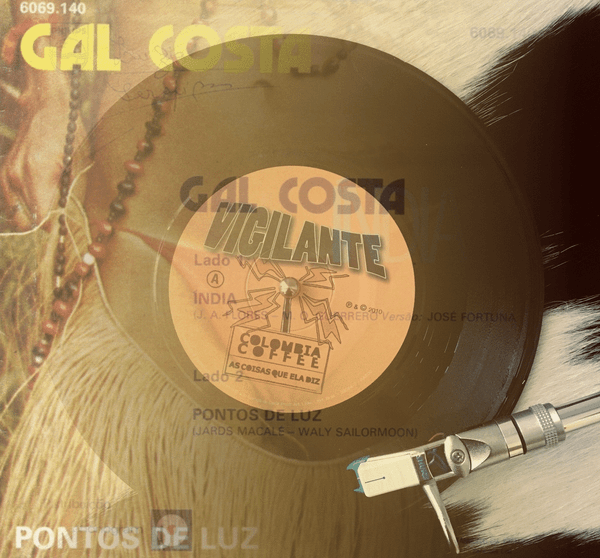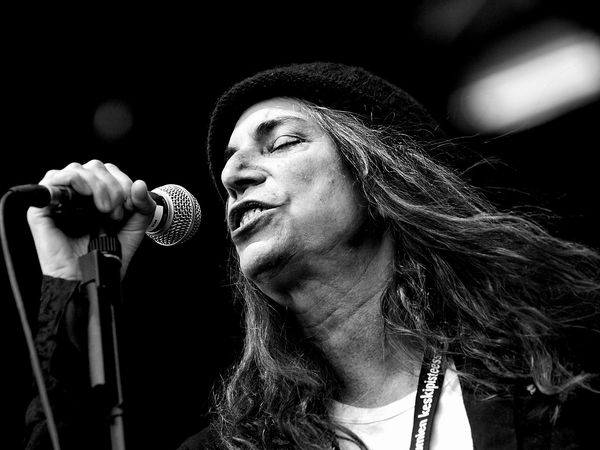by Rapha Grumser
Welcome to Single of the Month! Here you will find, once a month, two tracks curated, considered, and commentated for your reading and listening pleasure.
With this column, we at the Music section of LaidOffNYC will take inspiration from the 7-inch, 45rpm phonograph record, so that we may write about two tracks we love and would like you to know about.
Traditionally, the A-side and B-side of a Single would be two cuts off the same album. But for the purposes of this column, we will not necessarily limit ourselves to tracks from the same album, or artist, or genre, or even continent. The idea is to use the format to compile two recordings whose juxtaposition creates an interesting interplay. This week’s single features two songs from Gal Costa’s sixth studio album, Índia. The lyrics of both songs have been translated from Portuguese. These tracks, one evoking intense joy, the other deep heartbreak, demonstrate Costa’s incredible range as a performer.
A-SIDE
“Pontos de Luz” – Jards Macalé, Waly Salomão
I feel content
I feel very content
I feel completely content
Dare I say
Completely content
I’ll risk saying
I feel happy
I feel very happy
I feel completely happy
Dare I say
Completely happy
I had a composition teacher in college who loved to repeat Voltaire’s famous music-related quip: “Anything too stupid to be said is sung.” While Voltaire’s line may be a bit unfair to the great songwriters of the world, there is a profound underlying truth here—namely, that the meaning in a piece of music is not always to be found in its words, but rather, in its textures, its rhythms, its vibe, so to speak.
“Pontos de Luz” (“Points of Light”) is the eighth track on Gal Costa’s 1973 album Índia. Handled expertly by arranger Arthur Verocai, the song announces itself with a rhythmic riff: a call-and-response break between bass line and horns takes off, then settles into a lush groove that travels through several parallel suspended minor chords. Against this cool backdrop, Gal tells us emphatically that she feels happy, dare she say, completely happy. A smile is audible in Costa’s voice as she delivers the word contente. If “Pontos de Luz” is a lyrical acknowledgment of a good time, its music is an invitation to dance. Everything a listener needs to know about “Pontos de Luz'' can be gleaned without understanding what Gal is singing about.
Haitian-Canadian producer Kaytranada sampled “Pontos de Luz” on his 2016 track “LITE SPOTS.” He squeezes even more joy from Costa’s rendition by accelerating the sample 13 BPM and shifting the key up a whole step. In “LITE SPOTS,” the main dance break loops a sample of Gal singing “I feel completely content, dare I say, completely content.” This unbridled dancing joy is visually evident in the music video for “LITE SPOTS,” in which Kaytranada spends a day teaching a robot how to dance as they hang out in several spots across Los Angeles. There is something in his appropriation of Gal Costa’s recording that speaks to the power of vibe—how it is wordlessly communicated, scarcely translatable into language, more readily accessed by the movement of hips and limbs.
B-SIDE
“Volta” – Lupicínio Rodrigues
How many sleepless nights
I’ve rolled around in bed
Feeling so many things
That one can’t explain when they’re in love
The heat of the blankets
Doesn’t quite warm me up
There’s nothing in the world
That can push away this cold I feel in my chest
Come back
Come and live once again by my side
I can’t sleep without your arm
It’s what my body has grown used to
Dor de cotovelo is a Brazilian expression used to invoke the mixture of heartbreak and jealousy experienced after romantic misfortune. The phrase translates literally to “elbow pain,” and the poetic image it calls to mind is that of a heartbroken man finding solace at the local bar—head in his hands, elbows propped so long on the hard wood that they, too, begin to ail. Indeed, it is not impossible to imagine that in this same bar where our disillusioned lover drowns his erotic demons, Gal Costa performs her version of “Volta,” accompanied sparsely and with attuned sensitivity by Tenório Jr. on piano.
“Volta,” which translates literally to “come back” or “return,” was written by Lupicínio Rodrigues, a composer from the Brazilian south who, as Victoria Broadus writes in her blog, Lyrical Brazil, “became known as the master of a new genre that he perfected—dor de cotovelo.” Here, “elbow pain” is both colloquial expression and songwriting tradition. “Volta'' is firmly inside Rodrigues’s established genre; Gal’s interpretation is modern and sensitive in a way that is poignant but not schmaltzy.
In the chorus of “Volta,” the singer’s longing is focused toward a specific body part—the arm—for this is the limb of the lost love that lulls our singer to sleep. Sleeping with that arm is what she has grown accustomed to; it’s what provides solace to a tired body. “Love does not make itself felt in the desire for copulation,” Milan Kundera writes in The Unbearable Lightness of Being, “but in the desire for shared sleep.”

Rapha Grumser co-edits Laid Off NYC's Music section. Get to know him better: @raphagrumser



